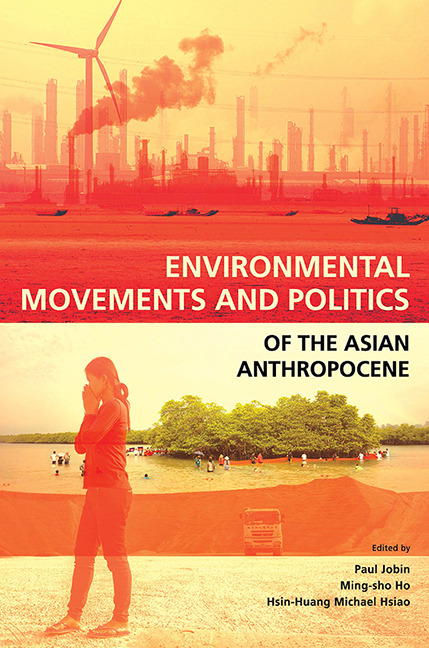Book contents
- Frontmatter
- Contents
- List of Tables, Maps and Figures
- Acknowledgements
- About the Contributors
- 1 Environmental Movements and Politics of the Asian Anthropocene: An Introduction
- 2 Environmental Movements in Taiwan’s Anthropocene: A Civic Eco-Nationalism
- 3 Environmental Movements in Post-handover Hong Kong: Between Managerialism and Radicalism
- 4 The Post-politics of Environmental Engagement in Singapore
- 5 Environmental Movements in the Philippines: Contestation for Justice in the Anthropocene
- 6 Environmental NGOs in “Post-New Order” Indonesia: Saving the Forests Through Democracy
- 7 Environmental Activism in Malaysia: Struggling for Justice from Indigenous Lands to Parliamentary Seats
- 8 State, NGOs, and Villagers: How the Thai Environmental Movement Fell Silent
- 9 Environmental Movements in Vietnam under One-Party Rule
- 10 The Cambodian Neopatrimonial State, Chinese Investments, and Anti-dam Movements
- 11 Conclusion: Environmental Movements and Political Regimes, or Why Democracy Still Matters in the Anthropocene
- Index
10 - The Cambodian Neopatrimonial State, Chinese Investments, and Anti-dam Movements
Published online by Cambridge University Press: 08 October 2021
- Frontmatter
- Contents
- List of Tables, Maps and Figures
- Acknowledgements
- About the Contributors
- 1 Environmental Movements and Politics of the Asian Anthropocene: An Introduction
- 2 Environmental Movements in Taiwan’s Anthropocene: A Civic Eco-Nationalism
- 3 Environmental Movements in Post-handover Hong Kong: Between Managerialism and Radicalism
- 4 The Post-politics of Environmental Engagement in Singapore
- 5 Environmental Movements in the Philippines: Contestation for Justice in the Anthropocene
- 6 Environmental NGOs in “Post-New Order” Indonesia: Saving the Forests Through Democracy
- 7 Environmental Activism in Malaysia: Struggling for Justice from Indigenous Lands to Parliamentary Seats
- 8 State, NGOs, and Villagers: How the Thai Environmental Movement Fell Silent
- 9 Environmental Movements in Vietnam under One-Party Rule
- 10 The Cambodian Neopatrimonial State, Chinese Investments, and Anti-dam Movements
- 11 Conclusion: Environmental Movements and Political Regimes, or Why Democracy Still Matters in the Anthropocene
- Index
Summary
Since it toppled the Khmer Rouge in 1979 with the help of Vietnam, the Cambodian People's Party (CPP) has been Cambodia's ruling party, under the strong leadership of Hun Sen who, since 1985, has doubled as the Prime Minister. Hun Sen and the CPP have thus ruled the country for over three decades. The CPP's legitimacy as a hegemonic party is based internally on its capacity to maintain political order and develop the economy, and externally on its ability to work with international aid donors, with different geopolitical agendas (China and the United States, in particular). Since the early 1990s, and thanks to the regional stability provided by the country's adhesion to the Association of Southeast Asian Nations (ASEAN) in 1997,1 Cambodia has experienced a rapid economic transformation built with the support of considerable financial aid from international donors, as well as the ruthless exploitation of the country's natural resources. The institutional basis for this political economy is a patronage network controlled by the CPP and its local allies, who reap financial windfalls from lucrative land deals (MacInnes 2015). This commercialization of the land encourages illegal logging and land grabs, which have already caused massive biodiversity loss and declining fish stocks (Connell and Grimsditch 2017). The forced dislocation of local populations has provoked indignation from international donors and reduced the CPP's popular approval. Nevertheless, state patronage based on land concessions and a brutal exploitation of natural resources remains the regime's strongest political asset.
Max Weber (1978, pp. 231–32) defined patrimonialism as a form of traditional domination: as long as the ruler abided the tradition, he could treat the administration and the military as his personal instruments. As in feudalism, under traditional patrimonialism, the subordinates accept submission to the ruler's personal power in return for various advantages (Weber 1978, p. 1026). In his study of sub- Saharan Africa, Eisenstadt (1973) drew on Weber to underline that the lack of political modernization excerbates practices of patronage and clientelism, a mechanism which he described as a modern form of patrimonialism or “neopatrimonialism”. Some recent studies have applied the notion of neopatrimonialism to the Cambodian context, to spotlight how the state apparatus has been captured by particular patronage interests (Cock 2011), and the consequences of that functional threat for nature-society relations (Milne et al. 2015).
- Type
- Chapter
- Information
- Environmental Movements and Politics of the Asian Anthropocene , pp. 295 - 328Publisher: ISEAS–Yusof Ishak InstitutePrint publication year: 2021

